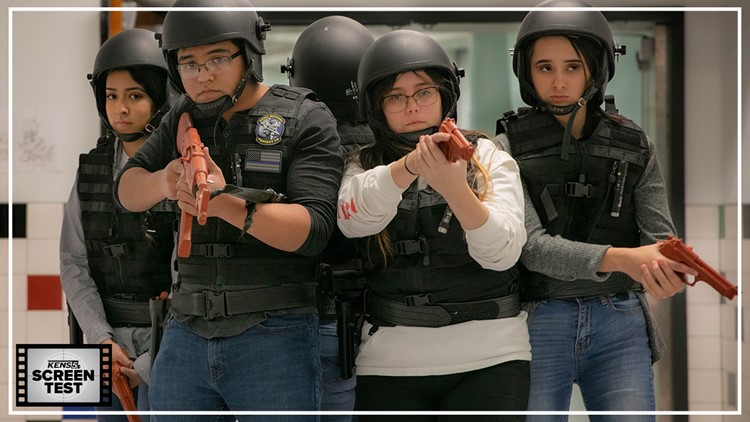Ten miles from the U.S.-Mexico border, in El Paso, a raid is unfolding. Guns are drawn, rooms are cleared, orders are barked.
But these “guns” are plastic replicas, these rooms’ walls are adorned with dry erase boards, and these orders aren’t coming from seasoned law enforcement personnel but from teens wearing vests and helmets. One of them – a boy who was maybe finishing an algebra equation or analyzing Homer’s “Odyssey” an hour beforehand – yells at someone to put down their phone, briefly stumbling on his words. Is it just a mental hiccup, or a sign of deeper-rooted hesitation?
In essence, that’s the question being explored in journalist-turned-director Maisie Crow’s “At the Ready,” a revealing documentary that premiered at the Sundance Film Festival last weekend and which serves to remind its audience that ostensibly binary circumstances are almost always flecked with shades of grey. And at Horizon High School’s Criminal Justice Club, where former law enforcement officers and Border Patrol agents lead interested teens – many of whom, if not most, have a Mexican-American background – through the basics of conducting drug raids and confronting potential criminals, the grey is applied in thick layers. But many of these kids have also been afforded the opportunity of political shortsightedness that comes with being a high school senior, and it’s here where Crow’s movie sources its wellspring of natural intrigue—where individual virtues that you may assume to be cut-and-dry are, in reality, cut and folded and tightened into a ball and paper-mâchéd over.
For one thing, there’s the prospect of financial stability. We learn that Border Patrol agents can start making $100,000 after just five years on the job, an excitable figure for young adults living in a city where, according to ZipRecruiter, the average salary is right around $60,000. It’s certainly music to the ears of the recently graduated Christina and her family; her father practically glows at the news that she’s taking the first steps toward working in law enforcement. Why shouldn’t he? He worked as a truck driver for years to raise his daughter. The equally-as-family-oriented Christina seems just as fulfilled about ensuring all his days on the road were worth it.
For another, when it comes to Mason – whose father is never home – the Criminal Justice Club has provided a sense of community, and also a sense of purpose when he’s selected to serve as commander in anticipating of an upcoming competition. Quieter than his classmates but also more emotionally insightful than most of them, Mason is a subject who fits in as much as he stands out. The club allows him to do more of the former, at least at the onset of his senior year.
Then there’s Cesar, another senior who seems to have clear eyes and a full heart about heading into a career that would allow him to protect his community. But there’s an emotional compromise to make on his end; his father lives in Juarez and can’t return stateside, having spent time in prison for drug-trafficking after being caught. What would it mean for Cesar to potentially join the same team that put him behind bars? Would he be able to separate work from family?
Crow has chosen her subjects wisely; by the movie’s end, Christina, Mason and Cesar will have all arrived at a crossroads, and it’s moving to watch these kids contemplate decisions that will shape their immediate futures while also reckoning with concrete mindsets. It’s even more substantial to watch the rough paths they take to get to that point. As she did with her first full-length documentary, “Jackson” – which chronicled the struggles of Mississippi’s lone abortion clinic to remain open – Crow captures the dovetailing of the personal and political with a generosity toward her subjects but also a foresight about what’s ahead.
For example: While “At the Ready” provides only a rare glimpse of the border fence that’s come to symbolize different things depending on who you ask, Crow and her crew are able to capture a mock debate between Mason, Cesar and their peers about whether the National Guard should help respond to an incoming migrant caravan that’s currently the favorite subject of 24/7 cable news. What message would that send to Mexico? What message would that send El Paso? The kids’ arguments are as half-hearted as you’d expect from teens just looking to do what they’re asked, but pay attention to the looks on their faces—and particularly on Mason’s, who holds back from contributing.
Later on, Christina watches a news report on her phone about what migrants hope to achieve, and though this particular observation feels a bit staged, the various conflicting feelings in her eyes decidedly aren’t. “That’s one thing I don’t like—to know that I’m cutting their dreams off,” she says, as if she’s been preparing to become a Border Patrol agent her entire life. Perhaps she has, and that consideration only makes that bit of the documentary even more potent.
While intimate in scope, “At the Ready” has a wide enough lens that it draws the instructors in the frame; functioning as a counterbalance of experience as much as a factor of influence for their students that’s prime for our interrogation. Here, too, however, things are fluid. For the audience member who sports a negative view of Border Patrol, the embracing empathy of Ms. Weaver – a former law enforcement agent who has refocused her career to teaching – may prove disarming. Ted Cruz supporters, meanwhile, may align with Mr. Guerra, who doesn’t hesitate to voice his support for the Republican amid the U.S. Senate race pitting him against Beto O’Rourke; the documentary broadens its contextual boundaries just enough to show why that proclamation may be met with skepticism by Guerra’s students. While “At the Ready” often has trouble committing to a structural anchor – the competition subplot feels a bit like an afterthought, even as it provides an explicit chronological marker of progress – the Cruz-O’Rourke battle comes to serve as a narrative through-line, especially when we see how the eventual outcome influences the courses that Christina, Cesar and Mason will take.
Those paths, of course, will continue to shape themselves beyond the credits as the teens forge ahead toward evolving ambitions—a realization that helps “At the Ready'' to end by transcending its political bends to become a real-world coming-of-age story. It’s simultaneously painful and cathartic to observe Christina, Cesar and Mason recognizing they have options; at the same time, the confident application of Crow’s journalistic instincts challenges our own perspectives and assumptions. You’re apt to finish “At the Ready” to find they’ve come upon their own crossroads.
Directed by Maisie Crow
2021
MORE SUNDANCE COVERAGE
- 'I want to lay bare what I'm seeing, share that with the world': 'At the Ready' director on telling her subjects' stories through their eyes
- ‘Cusp’ Review (Sundance): Restrained new doc presents a mosaic of thorny teenage Texas life
- 'We were learning the whole time': 'Cusp' co-directors on capturing the aimlessness of being a teenage girl in small-town Texas
- ‘The Blazing World’ Review (Sundance): Horror-fantasy's beguiling style coats an inert narrative
- ‘Life in a Day 2020’ Review (Sundance): Capturing humanity in a devastating year, with humanity’s help
- ‘Cryptozoo’ Review (Sundance): A psychedelic fantasia of mystical beasts and hand-drawn ingenuity
- ‘One for the Road’ Review (Sundance): Swoon-worthy drama stumbles under the weight of melodrama down the homestretch
- ‘Son of Monarchs’ Review (Sundance): Unhurried immigrant drama attempts to balance the metaphysical with the strictly scientific
- 'The Most Beautiful Boy in the World’ Review (Sundance): Swedish doc paints vivid, haunting portrait of instant stardom



